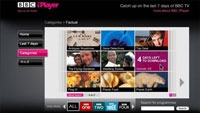European broadcasters seek to exploit catch-up boom
The professional video industry's #1 source for news, trends and product and tech information. Sign up below.
You are now subscribed
Your newsletter sign-up was successful

Big increases in consumption of catch-up content during 2011 have been reported by several leading European countries including the UK, Netherlands and all the Nordics, encouraging plans to expand the scope of existing portals to include use of companion screens for interactivity and access to extra information. In the Netherlands, 206.8 million streams were requested in 2011 for Uitzending Gemist, the catch-up service for all Dutch public broadcasters, an increase of 16 percent over 2010. This was despite an overall decline in viewing time share for the public broadcasters from 37.6 percent to 34.3 percent, and despite the fact that catch up viewing on other platforms, such as those from cable operators UPC and Ziggo, FTTH operator Glashart Media, and IPTV provider KPN, were excluded.
The figures for the BBC iPlayer in the UK were even more impressive, with 187 million monthly requests across all platforms in December alone, a 29 percent increase on December 2010 when the service was already very popular. There were huge increases in consumption on Internet connected TVs, which attracted 7 million views in the month, compared with around 600,000 a year earlier, while mobile phones were up 163 percent at 13 million views, and tablets up 596 percent at 10 million. The explosion in tablet viewing in particular has prompted the BBC to consider extending the scope of iPlayer to two screen applications, to allow users to interact more deeply with the content, and possibly via Facebook and Twitter. This brings the potential for integrating so called complementary content, such as backgrounds on actors and additional information relating to the substance of a program, or even on clothing that someone on the screen is wearing, much more readily than with a single screen.
As a broadcaster rather than operator, the BBC is restricted in its ability to exploit two screen applications for linear distibution, except in partnership with a pay TV operator, but with iPlayer can establish direct relationships with viewers on PCs, tablets, connected TVs and smartphones. Currently, the iPlayer is only a single screen device, but it is a good bet that will change soon.
Meanwhile, broadcasters in some other leading European economies are striving to catch up on catch-up. Swiss Telco Swisscom is only now adding a catch-up TV feature to its IPTV service “Swisscom TV,” allowing customers to watch programs from 70 channels up to 24 hours after their original broadcast. Meanwhile, in Germany, the Bundeskartellamt (Federal cartel authority), in November 2011, opened antitrust proceedings reviewing the VOD platform proposed by public broadcasters ARD and ZDF. Earlier, the authority blocked plans for similar services from commercial broadcasters RTL and ProSiebenSat.1 on the basis that it would give them too much control of the advertising market.
The professional video industry's #1 source for news, trends and product and tech information. Sign up below.
